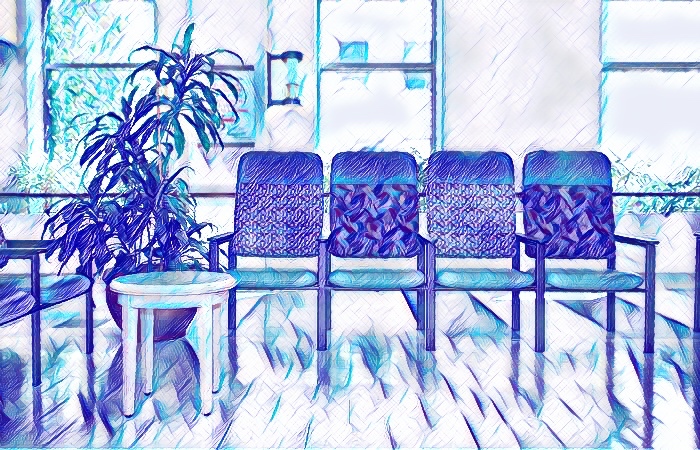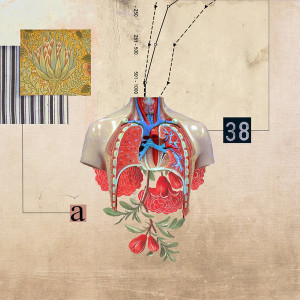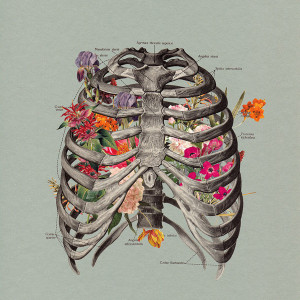“I’m thankful I’m not a horse,” Marla says, as she reaches for the saltine sleeve inside her tote bag.
Marla says weird shit like this all the time. She’s the kind of person who thinks everything she says makes complete sense, even though she begins stories in the middle.
“Can you believe poor Lily might be pregnant for eleven months?” she continues, all the while in motion, her head swinging her ponytail like a wrist readying to rope a calf, her fingers fumbling the crackers, so the crumbs form a steady stream along her black t-shirt’s wrinkles, mirroring Pollock’s drips in the lithograph hanging behind her.
I half-cover my mouth and rub my beard before answering her. Often, I wonder if the questions Marla presents to me are rhetorical, since she often doesn’t wait for my reply, and I imagine oscillating cartoon bubbles, containing those unanswered, unfulfilled inquiries, following her around like in TV commercials, the ones where clouds trail depressed people until they buy the right medication, or in that television ad, where that dismembered, smiley face goes bouncing from department to department to change prices, whistling that creepy tune the whole time.
“Well, honey,” I say, as I walk to the stainless, kitchen sink. “Horses may not feel the same as humans. I read mares don’t have morning sickness.”
Marla nods, to me or the file folders she sorts through in her bag, I can’t tell. She’s told me she can do dichotomous listening, so maybe she can respond to me and her inert materials simultaneously. I’ve no doubt she could be a professional eavesdropper, based on her behavior at restaurants, where she can recount the full conversation between the neonatal nurse and her daughter who’s considering an abortion, compared to only about half of what I’ve said. Believe me: the irony of Marla being a communications professor is never lost and is one of my favorite things to tease her about.
And I want to keep teasing her—about her constant rushing, her tendency to anthropomorphize with Lily, her habit of extracting the recyclables from her classroom’s garbage cans—for a long, long time.
I set my coffee on the counter because her lower neck beckons me, her head still bent into her bag, as she fingers and sorts. The hair below the ponytail band is baby fine, curly, soft, and I rub my fingers across it, so she jumps a bit, surprised, tickled, and maybe aroused.
“Slow done, babe,” I whisper, while moving my fingers around her neck, then down past her shoulders, until my hands land below her breasts, crisscross, and my errant thumbs brush up the sides.
It takes a few moments for Marla’s body to respond, to contract into mine, since she maintains focus, amassing used tissues and wayward folic acid tablets on the kitchen table. Sometimes, she reminds me of a kid playing tag, like she is waiting to be “unfrozen” and needs some keyword or special permission to move again, onward, to be “it.” This morning, though, she concedes sooner, bending her neck over my right shoulder, her signal for me to place my chin over her left one.
Right now, Marla and I keep our pose for a minute or two until her hands set over mine, then slide them lower. We sort of sway, hip to hip, up and back, in the house’s silence. Marla pivots slowly to the left, turns her head toward me, cups my beard, her fingers so much colder than her neck. As she smiles, I hear her I-phone’s ringtone, though we don’t move or jump away from one another, at least not immediately. But the volume is too high and halts our dance.
“That could be the doctor’s office,” Marla says, her fingers tapping my cheek. “Nina said she’d call if there were any earlier cancellations.”
I grip tighter, wanting to forget the phone, to remind Marla of how contemporary technology allows us to “decline” a caller and therein live anxiety-free. I abhor clichés, forbid my students from using them, but right now, despite myself, I keep thinking of Thomas Gray’s “Ode on a Distant Prospect of Eton College,” the source of “ignorance is bliss,” a great line, shamefully overused out of context.
“Sure, go ahead,” I say, patting the left side of her behind, what I call her “Baked Alaska” before she heads to the kitchen counter, the recharging phone.
I listen for Marla’s high-pitched “Hello” while I watch her stroke the hard bump where her navel piercing used to be. This has become her newest gesture, as I try to recall what she used to do. Hold her chin? Finger the little hoops in her left ear? That was “B.P.,” “before pregnancy” as we call it.
“No, no, that’s fine,” she says into the receiver, her voice drawing me away from her stomach.
She nods into the phone, then turns to me, crossing her eyes. I know by her look it’s Diana on the other end.
“Carl’s here with me, so we can meet you at the barn on our way to the office,” she says, “but we have to make this quick. Don’t forget his phone, okay?!”
I roll my eyes back and start to collect my pocket supplies: wallet, keys, inhaler. Though she’s four years younger, Marla acts like the older sister in her family; in fact, when she had to do one of those personality tests during a departmental retreat, her top signature strengths were “woo” (if that can even be a noun) and “includer,” always the glue between people, relationships.
“My appointment’s at 11:15,” she says, flipping her hand in a circle, as if to speed up the conversation, “so we need to get moving. Leave now, Di. Love you.”
Every day includes Diana—phone calls, texts, pop-ins–and I refer to her as “the omelet,” since she’s always so scrambled, throwing out utility bills by mistake, double-booking appointments. Marla, on the other hand, is borderline compulsive with her organization; I can call her from work, and she can tell me where my “lost” sunglasses are in the office. She does the same, at an exponentially higher rate, with Diana.
Marla, now off the phone, is stroking my back.
“Come on, honey,” she says. “Let’s check in on Lily, get your phone, and then head to the appointment. We’ve got a built-in excuse, so we can’t hang with Diana too long. I know you’ll be disappointed,” she finishes, giving my rib cage a little push, then grabbing my hand and leading me to the door.
I pull my satchel off the hall-tree hook and zigzag it across my chest. After unbuckling the flap, I pull out the two unmarked sets of papers I’ve been carrying around a week, start to throw them on the bench attached to the coat-rack because I don’t like seeing anything empty. I want signs of Marla everywhere. While she brushes her teeth, I stare at the reading glasses on her nightstand. Sometimes, before I head to campus, I leave her scarf on this barren bench. But now, knowing I won’t be able to concentrate today, I push the papers back inside my bag. Maybe through osmosis, they’ll get graded.
Though Marla teases me about my geriatric driving tendencies, she slips into the passenger seat. I like her silent deference, my being at the helm, though I struggle getting into the driver’s seat, my legs far longer than the distance Marla’s seat allows.
On our drive, Marla busies herself by sorting through the coupons she keeps in the glove compartment, tossing the expired ones into the plastic bag she’s jerry-rigged around the gear-shift. I alternate between monitoring her activity and looking at the corn panorama, which amazes me year after year, the way these previously-barren fields transform into fortresses, the corn so high, I can no longer see the three miles ahead of me where Lily lives.
“I can’t wait to see how Lily’s belly looks,” Marla says, as she pushes the circulars into the bottom of the bag, then uses her index finger to circle a loose curl behind her right ear.
In our six years together, I’ve learned a lot about Tennessee Walking Horses, as Lily came with Marla, a package deal. They are exceptionally docile, smart, and beautifully-gaited animals, and more emotive than I’d have imagined.
Like any other time we enter the stable, I feel calm, perhaps by extension. I love how happy Marla is, how she squats and widens her arms as if Lily will gallop into her hug, how Lily takes her away from life, from today.
As many times as I’ve been here, I still look up to the cathedral ceiling, its fraying wood beams where the sun’s rays protrude. I feel like I’m in a children’s book illustration. Of course, then I look down to avoid the horseshit clumps encircled by flies.
“How’s my beautiful one?” Marla asks, walking straight to Lily’s head, which rests over a wooden slat. “Your tummy’s looking fuller, Mama. Feeling all right?”
“Shit, Lily: you’re giant,” I echo, as I join Marla while she rubs between the ears, and Lily divots her right hoof. “How does she carry all that weight on those bird legs?”
“I know,” Marla says. “She reached one hundred at her last weigh-in. Wish I handled this baby as well as you do, girly,” Marla says, moving her hand down the mane, Lily moving into the cranny under her arm.
“I’m here,” Diana suddenly calls, sidling up to my left . “Here’s your phone, Bro. Sorry about that,” she continues, before planting a quick kiss on my cheek and moving to Marla.
The battery icon on the phone is barely shaded, its power almost shot. I stick it in my front jean pocket without checking for voicemails.
“You did good, getting here on time,” Marla says, extending her left arm to hug Diana, so her right hand continues stroking Lily. “That a new shirt?”
“I found it at the bottom of my closet this morning, tag still on,” she says, as Marla winks at me, and I smile. “Does it work? I feel like I might look too busty.”
I laugh, even though I try not to, so it comes out like a half-spit explosion. Diana’s the kind of woman who, when she gets drunk, excuses herself to the bathroom, then returns without a bra on, and she always announces her change of wardrobe.
She turns to me.
“What?” she asks, but she smiles, as we’ve had variations of this conversation before. “I know, I know. But I’m sober now, dude,” and she chuckles, the remnants of twenty-years of smoking in her laugh.
Walking over to them, I put an arm around each, so with Lily, we form a complete circle, our own tableau, and I shiver.
“You warm enough, babe?” Marla asks, nudging her ear against my armpit.
“Yeah. Fine,” I tell her, re-squeezing the two, bookended shoulders. “Just felt a quick draft.”
“You know what would warm you up?” she asks, breaking free from our hold. “A ride on Lily. Dr. Sullivan said she still needs exercise in her condition.”
“I’m good,” I laugh. “Really. Besides you’re the expert rider.”
“That’s what I’m thinking,” she says while walking to the corner of the stall where she leaves her saddle. “I’d love to get some fresh air.”
“What are you talking about?” Diana asks, as she rotates away from Lily. “You’re at six months. Carl, she’s not serious, is she?”
I answer by turning to Marla who is attempting to hoist the saddle over her right shoulder.
“Marla, put that thing down,” I say as I walk to her. “Are you trying to be a humper? You ain’t in bloody England anymore.”
Marla grins, as she’s told me numerous times how roadies are called “humpers” in the UK. She knows this because she dated one during her study abroad year. Still, she keeps her hand affixed to her load, skirts around me toward Lily.
“Come on, you guys,” she says. “I need this. Lily will be good to me. She understands my condition.”
In spite of the pregnancy, she lobs the saddle onto Lily in one swift, fluid motion. I just watch for a minute, like I’m seeing something out of context, until peripherally, I catch Diana pulling on Marla’s arm.
“For crying out loud, Marla,” Diana says. “Cut it out. We already have enough to worry about with you. Right, Carl?”
At that moment, I want to jump on Lily, to run away from this scene because I don’t want to side with Diana. She’s not supposed to be the sensible one.
“She’s right, Marla,” I say, as I grab the currycomb from the stall’s hook. “Let’s just stick with brushing Lily today. You know how good that scalp massage feels.”
I hold the comb out for her, but she eyes the stirrup, bends her left knee and lifts the right up.
“Damnit, Marla,” I yell and reach for her waist, pulling her into me. “This isn’t fucking funny. You’re not riding Lily. Just cool it.”
Thankfully, I overpower her. In my clutch, Marla feels like a ragdoll, her arms limp, her feet barely touching the ground. I prop her up a bit, though her head, as if devoid of muscular control, points down: she could be a drunk or one coming to from a concussion.
“Are you all right?” Diana asks, as she palms Marla’s cheek, and Marla nods back. “What the hell was that? You’ve got to look after yourself.”
Her sister’s words trigger Marla: she seems to come to attention, pushing her hands down on mine to make her body go upright.
“Yes, yes. I’m fine,” she says, moving her hand to pat Diana’s, which still rests on her face. “I didn’t mean to worry you two. I think sometimes I just feel like a break from this.” She points to herself, kind of where her sternum is. “You guys get that, right?”
I expect to stay pissed off, to lecture more, but I’m over it. For this moment, I feel like I’ve saved Marla, and I want to hold onto that.
“Sure, Annie Oakley,” I say, as I reach for her ear to stroke its exterior. “But don’t pull that kind of shit again. If you need to mount something that badly, I’ve got a pretty free schedule.”
Marla rolls her eyes at Diana, who does the same gesture back, and I laugh, then take a quick glance at my watch. It’s like we’ve been part of a sitcom, resolving crisis in a six minute segment between commercials. I approach Lily to remove her saddle, as Marla looks on, returns to her roles as good sister, wife, and patient.
“You know, we need to get going,” I say, carrying the saddle by its cantle and horn to its resting place.
“Why don’t I come along?” Diana asks, volleying her head between mine and Marla’s. “I know Mom and Dad are too much, but I can be there to represent,” she says, mocking an Italian accent.
“We’re good,” Marla says. “Thanks, though.” She gives Lily a full-on hug, pressing down her toes to reach up and wrap her arms around Lily’s neck; she looks like a little kid the way she hangs, an impromptu Norman Rockwell painting.
“See you soon, Lily,” she says, “And rest up. You’ve got a big bun in that oven,” she says, as she gives one last pat to her side.
Lily appears to nod back at Marla, but that’s probably just me anthropomorphizing. The three of us exit together, and before getting into the cars, dosey doe hugs and kisses. Diana embraces me tight.
“She’ll be fine,” she whispers on my right, then pulls back, flails her hands in backwards waves to us, and opens her car door.
At our respective car doors, Marla cocks her head at me over the car’s roof.
“That wasn’t too bad, was it?” she queries.
I prop myself up on the inner car’s edge, line my feet near the trunk and gas tank controls, so I can look straight across at Marla’s yellow brown eyes.
“All good,” I say, stretching my hand toward her. “Diana was in great form today. No complaints.”
We smile, not the full type where teeth show and mouths open, but in quiet grins, and we simultaneously lower ourselves into the sedan, buckle our seatbelts, and briefly kiss before we head to the University Medical Park.
Dr. Struthers’ waiting room is inviting, the walls painted in psychologically-pleasant blue, flat-screen TVs streaming the Food Network. Marla walks up to the open, reception desk—no sliding windows here—and Nina’s toothy smile. I join the others on the plush, brown couches. There are many couples here, the supporting partners: some loop their elbows and whisper, some retrieve coffee for one another, all of us so used to this routine.
Marla tugs her shirt down to her hips, as she walks toward me. I tap the cushion next to me, and she obeys, plopping her purse to her right. She palms my knee, then squeezes a bit.
“You doing, okay, babe?” she asks, her shoulder nudging into mine. “I’m thinking positive. Lily’s doing well, so why shouldn’t I be? We’ve got the “McClintock Effect” to consider, after all,” and she grins just enough for her a dimple to surface.
“Here we go again,” I respond, squeezing her thigh in return.
Marla’s convinced that pheromones played a role in her and Lily becoming pregnant at the same time. When I remind her that Lily lives outside of our house, plus our colleague’s stallion factored into the equation, she usually cuts me off.
“I know you think I’m silly,” she says, looking me straight on, “but I feel the connection. Always have with Lily. And if that makes me feel better now, then I’m sticking with it.”
She nods her head, with her eyes closed, then turns back into her seat, and increases the pressure on my leg.
I monitor the door, the one leading into the exam rooms. It’s innocuous, really, almost blending into the wall, but after waiting for it to open so many times, I focus right on its hinges. Carol usually calls us back, her purple-rimmed glasses and sparkly barrettes belying the seriousness of the place, the awaiting diagnoses.
And even though the practice prides itself on getting patients in quickly, I hate this waiting, so prolonged, this mystery. Of course, I mostly hate it for Marla, how she has to worry about recurrences, more treatments, her mortality on a daily if not a momentary basis. We knew we wanted kids, at least one, but when Marla, jumping up and down in her flowered tank and boyshort undies, showed me the blue line on the First Alert test, I could barely speak. We had agreed to wait at least two years, the oncologist’s recommendation.
“I know it’s sooner than we planned,” she said, waving the stick like a thermometer, her hair flying at wild angles. “But, this must be my body’s way of saying it’s ready, it’s healthy again.”
She sort of collapsed into me, her body free of worry, constraints, disease. I can’t resist Marla when she concedes, lets me protect and care for her. So, I’ve been trying to forget the risks, but sitting here reminds me of the four-hour, chemo drips, and the radiation tattoos.
Right now, Marla presses her back to the couch, closes her eyes, and I imagine she’s self-talking herself into a trance. I want to be that calm, pretend to be for her, when she tells me how badly she feels putting me in this situation again. I tell her to stop, to think and care for herself, not worry about me, and I mean it. I know I do.
But now, as she drifts, I let my mind loop, let it face its truth. I can’t believe this is happening again. I’m not a religious man, but I want to get a hold of a god, a mighty power, whoever or whatever that is, and get some answers, have my voice heard.
I search the waiting room for someone who looks religious, maybe wears a cross necklace or reads Chicken Soup for the Soul. Maybe I can ask one of them my questions, to be my godlike stand-in. I just need something.
I’m sure if I went to therapy, I’d be told to embrace my emotions, even if they make me feel uncomfortable, or if I had the balls to be a cutter or deprive myself of dessert, I could self-flagellate.
Instead, in this waiting room, where pink ribbons adorn every pen, every Kleenex box, every uniform, I reach for Marla’s hand, bring it to my mouth, kiss it three times. Her skin tastes flowery from hibiscus lotion, and I keep holding on, inhaling knuckles, molecules, her. She opens her eyes, turns toward me, lowers her head, like a sleepy toddler, onto my shoulder. Together, we wait for the door to open.





